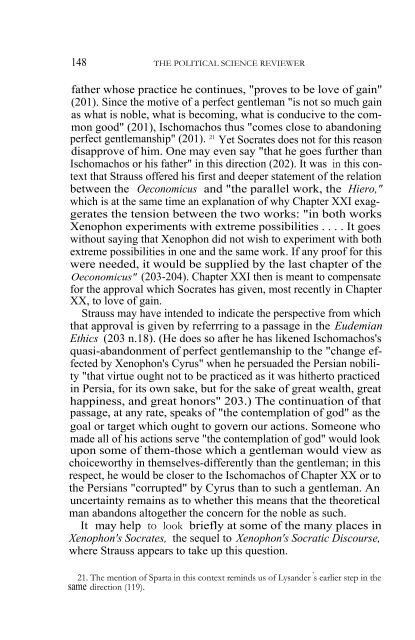Strauss on Xenophon's Socrates Xenophon's Socratic Discourse: An ...
Strauss on Xenophon's Socrates Xenophon's Socratic Discourse: An ...
Strauss on Xenophon's Socrates Xenophon's Socratic Discourse: An ...
You also want an ePaper? Increase the reach of your titles
YUMPU automatically turns print PDFs into web optimized ePapers that Google loves.
148 THE POLITICAL SCIENCE REVIEWER<br />
father whose practice he c<strong>on</strong>tinues, "proves to be love of gain"<br />
(201). Since the motive of a perfect gentleman "is not so much gain<br />
as what is noble, what is becoming, what is c<strong>on</strong>ducive to the comm<strong>on</strong><br />
good" (201), Ischomachos thus "comes close to aband<strong>on</strong>ing<br />
perfect gentlemanship" (201). 21 Yet <strong>Socrates</strong> does not for this reas<strong>on</strong><br />
disapprove of him. One may even say "that he goes further than<br />
Ischomachos or his father" in this directi<strong>on</strong> (202). It was in this c<strong>on</strong>text<br />
that <str<strong>on</strong>g>Strauss</str<strong>on</strong>g> offered his first and deeper statement of the relati<strong>on</strong><br />
between the Oec<strong>on</strong>omicus and "the parallel work, the Hiero,"<br />
which is at the same time an explanati<strong>on</strong> of why Chapter XXI exaggerates<br />
the tensi<strong>on</strong> between the two works: "in both works<br />
Xenoph<strong>on</strong> experiments with extreme possibilities . . . . It goes<br />
without saying that Xenoph<strong>on</strong> did not wish to experiment with both<br />
extreme possibilities in <strong>on</strong>e and the same work. If any proof for this<br />
were needed, it would be supplied by the last chapter of the<br />
Oec<strong>on</strong>omicus" (203-204). Chapter XXI then is meant to compensate<br />
for the approval which <strong>Socrates</strong> has given, most recently in Chapter<br />
XX, to love of gain.<br />
<str<strong>on</strong>g>Strauss</str<strong>on</strong>g> may have intended to indicate the perspective from which<br />
that approval is given by referrring to a passage in the Eudemian<br />
Ethics (203 n.18). (He does so after he has likened Ischomachos's<br />
quasi-aband<strong>on</strong>ment of perfect gentlemanship to the "change effected<br />
by Xenoph<strong>on</strong>'s Cyrus" when he persuaded the Persian nobility<br />
"that virtue ought not to be practiced as it was hitherto practiced<br />
in Persia, for its own sake, but for the sake of great wealth, great<br />
happiness, and great h<strong>on</strong>ors" 203.) The c<strong>on</strong>tinuati<strong>on</strong> of that<br />
passage, at any rate, speaks of "the c<strong>on</strong>templati<strong>on</strong> of god" as the<br />
goal or target which ought to govern our acti<strong>on</strong>s. Some<strong>on</strong>e who<br />
made all of his acti<strong>on</strong>s serve "the c<strong>on</strong>templati<strong>on</strong> of god" would look<br />
up<strong>on</strong> some of them-those which a gentleman would view as<br />
choiceworthy in themselves-differently than the gentleman; in this<br />
respect, he would be closer to the Ischomachos of Chapter XX or to<br />
the Persians "corrupted" by Cyrus than to such a gentleman. <strong>An</strong><br />
uncertainty remains as to whether this means that the theoretical<br />
man aband<strong>on</strong>s altogether the c<strong>on</strong>cern for the noble as such.<br />
It may help to look briefly at some of the many places in<br />
Xenoph<strong>on</strong>'s <strong>Socrates</strong>, the sequel to Xenoph<strong>on</strong>'s <strong>Socratic</strong> <strong>Discourse</strong>,<br />
where <str<strong>on</strong>g>Strauss</str<strong>on</strong>g> appears to take up this questi<strong>on</strong>.<br />
21. The menti<strong>on</strong> of Sparta in this c<strong>on</strong>text reminds us of Lysander ' s earlier step in the<br />
same directi<strong>on</strong> (119).

















